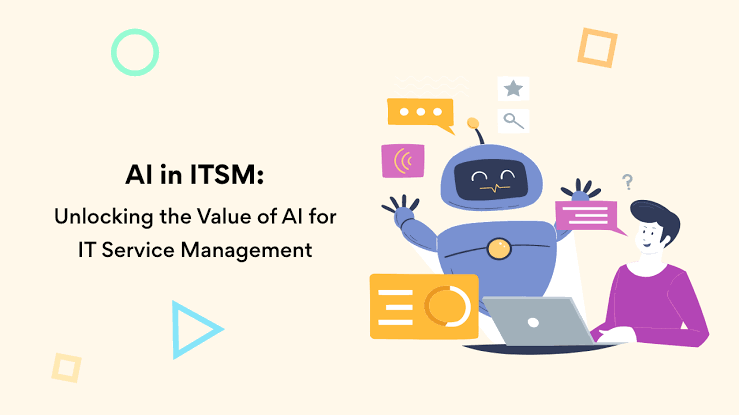Explore the transformative role of AI in automating IT service management. This article discusses the benefits of AI, including increased efficiency, improved response times, and enhanced decision-making. Learn about key applications such as chatbots, predictive analytics, and incident management automation. While addressing challenges like data quality and integration, the piece highlights future implications of AI in ITSM, including personalized services and greater focus on strategic initiatives. Discover how embracing AI can lead to more effective and efficient IT operations.
The swift progress of intelligence (AI) is revolutionizing industries, including technology. A notable area where AI is making waves is in IT service management (ITSM). Through the automation of tasks and the improvement of decision making processes AI is optimizing workflows, enhancing service quality and boosting productivity within IT teams. This article delves into the role of AI in automating IT service management, showcasing its advantages, uses, challenges and potential future implications.
Understanding IT Service Management
IT service management involves the organization of IT services to meet an organizations needs. This includes processes like handling incidents, managing problems, overseeing changes and fulfilling service requests. Typically IT service management relies on processes that can result in inefficiencies, mistakes and delays in providing services. This is where AI steps in offering solutions to improve the efficiency of IT service management practices.
Benefits of AI in IT Service Management
AI technology offers benefits, in managing IT services making it a vital part of modern IT operations. Some of the advantages are. Increased Efficiency AI streamlines tasks allowing IT teams to focus on problem solving. By minimizing time spent on tasks organizations can boost productivity and allocate resources efficiently. Faster Response Times AI powered tools enable organizations to address incidents and service requests swiftly. Chatbots and virtual assistants can handle inquiries and provide support ensuring users receive prompt assistance without human involvement. Improved Decision Making AI algorithms analyze data to uncover patterns and trends leading to decision making in IT service management. Predictive analytics can help organizations anticipate issues before they escalate allowing for proactive measures to be implemented. Cost Reduction By automating processes and decreasing reliance on manual intervention organizations can reduce costs. AI can optimize workflows reducing the resources needed for IT service management.
Applications of AI in IT Service Management
AI technology can be incorporated into various areas of IT service management to boost efficiency and enhance user satisfaction. Here are some key uses of AI in this field.
1. Chatbots and Virtual Assistants. These AI powered tools are capable of handling user requests such, as resetting passwords or troubleshooting issues. By offering support chatbots alleviate the workload on IT personnel and enhance user contentment.
2. Automated Incident Management. AI can automatically classify and prioritize incidents based on their severity and impact. This automation ensures that issues are addressed promptly while less urgent requests are handled effectively.
3. Predictive Analytics. AI can examine data to forecast potential service disruptions or incidents. By recognizing patterns and trends organizations can take measures to minimize interruptions and enhance overall service dependability.
4. Change Management Automation. AI can simplify the change management process by assessing the potential impact of changes on systems. This evaluation aids organizations in making decisions and mitigating risks associated with implementing changes.
Challenges in Incorporating AI into IT Service Management
While the integration, of AI into IT service management brings about advantages organizations also have to deal with obstacles. Here are some common challenges they may face.
Data Quality AI relies on quality data for accurate predictions and decision making. Organizations need to ensure their data is clean consistent and relevant to fully harness the potential of AI applications.
Integration with Systems To implement AI solutions smoothly blending them with ITSM tools and processes is essential. Organizations might encounter compatibility issues or resistance from employees who are used to methods.
Skill Gaps Successfully deploying AI often demands expertise and knowledge. Organizations should invest in training programs to equip their IT teams with the skills needed to effectively utilize AI technology.
Change Management: When introducing AI into IT service management (ITSM) processes employees may resist due to fears of job displacement or reluctance to embrace technologies. To address these concerns and ensure a transition effective change management strategies are crucial.
Future Impact of AI on IT Service Management
The integration of AI in automating IT service management is poised for growth in the years ahead. As AI technology advances organizations can anticipate more applications in ITSM. Here are some potential future developments;
Personalized Services: AI will empower organizations to offer tailored IT services based on user behavior and preferences. This level of customization can improve user satisfaction and overall experience.
Improved Collaboration: AI powered tools will enhance collaboration between IT teams and business units. By providing insights into service performance and user requirements organizations can align IT services more closely with their goals.
Ongoing Enhancement: AI technology empowers companies, to embrace a process in managing IT services. By examining data and user input organizations can consistently fine tune and enhance their procedures resulting in progress, service provision.
Increased Emphasis on Plans: Automation of tasks will free up IT teams to concentrate on initiatives that foster creativity and expansion. This transition will enable businesses to utilize technology efficiently and maintain a competitive edge, in an evolving environment.
Conclusion
The incorporation of AI, into IT service management is transforming how companies provide and oversee IT services. Through the automation of tasks, the enhancement of decision making processes and the acceleration of response times AI presents a route towards increased efficiency and effectiveness in IT teams. Although there are challenges to overcome the potential advantages of AI in ITSM significantly surpass the obstacles. As technology progresses organizations that adopt AI powered solutions will set themselves up for success, in a growing digital landscape. By allocating resources towards AI in IT service management businesses can not improve their performance. Also elevate user experiences and foster innovation.
